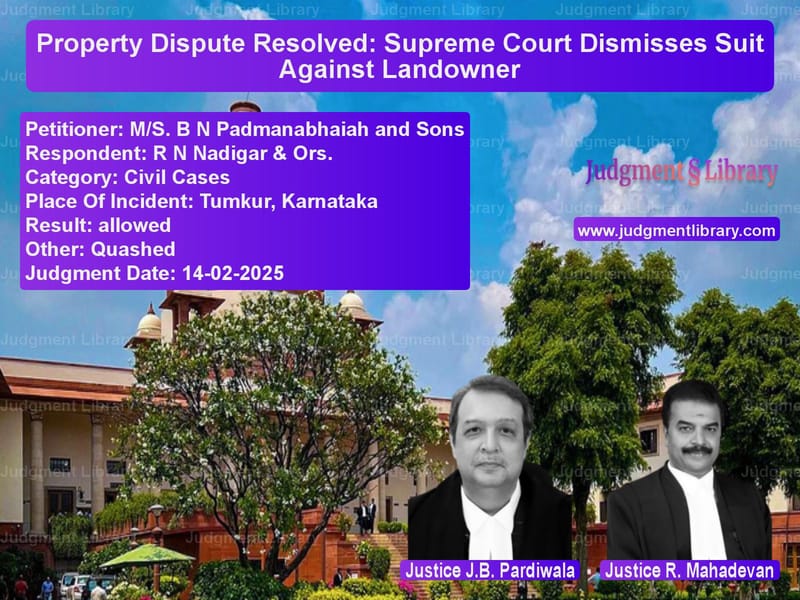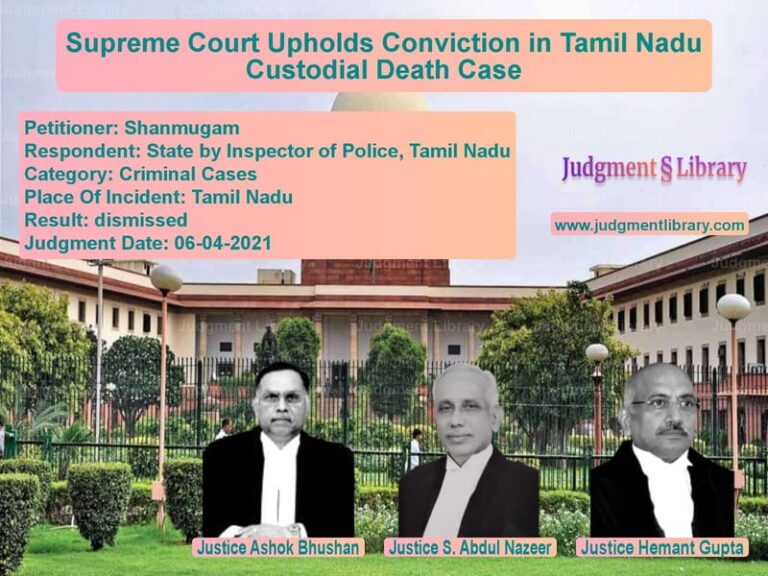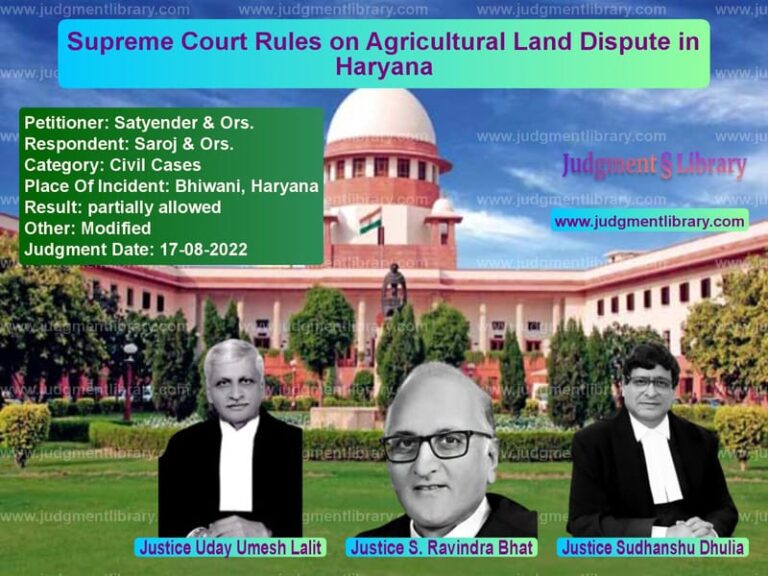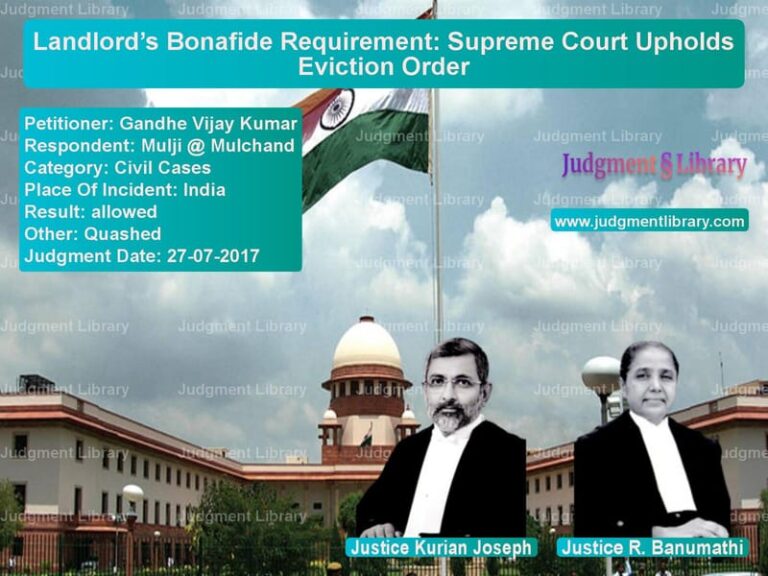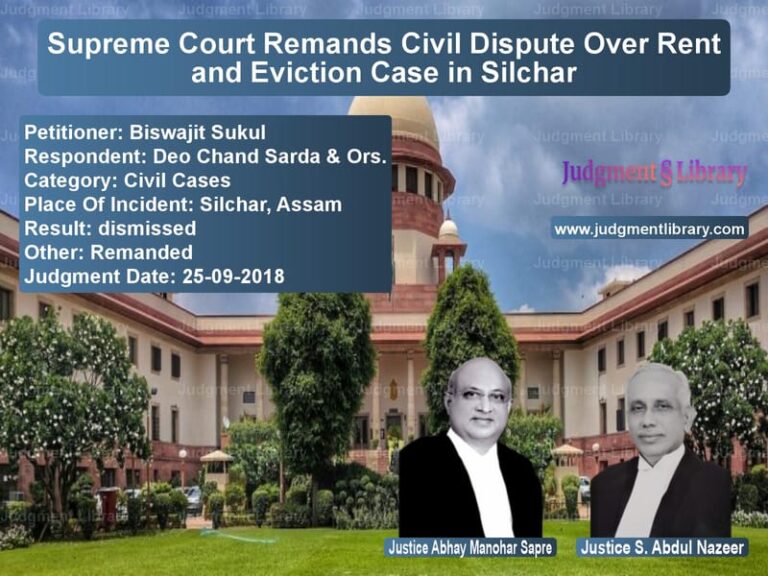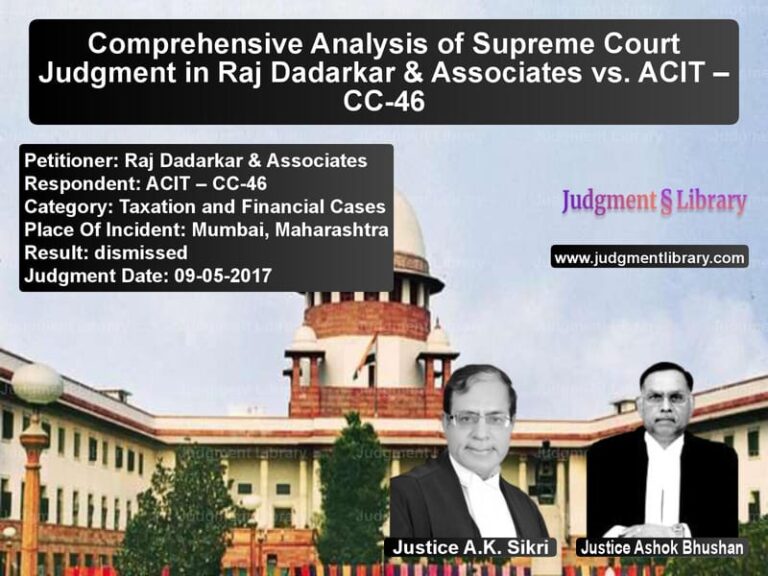Property Dispute Resolved: Supreme Court Dismisses Suit Against Landowner
The Supreme Court of India has recently pronounced a significant ruling in the case of M/S. B N Padmanabhaiah and Sons vs. R N Nadigar & Ors., addressing a long-standing property dispute over land ownership and public interest claims. The case revolved around a piece of land in Tumkur, Karnataka, where former students of a government school, claiming to act in a representative capacity, filed a suit to declare the government as the rightful owner of the land. After multiple rounds of litigation, the Supreme Court dismissed the suit, holding that the plaintiffs lacked legal standing to challenge the landowner’s title.
The dispute originated from claims that the property in question, a part of Survey No. 81/1 in Tumkur, had been forfeited by the government due to non-payment of land revenue in 1919. However, the appellant, M/S B N Padmanabhaiah and Sons, argued that they had acquired the property through legal means and had been in possession for over 60 years. The case raised essential questions regarding property rights, res judicata, and the role of public interest litigants in civil disputes.
Background of the Case
The case revolved around a piece of land measuring 15 guntas in Survey No. 81/1A, Tumkur, which had been subject to competing claims:
- The plaintiffs (former students of the Government Junior College, Tumkur) filed a suit claiming that the land belonged to the government and should be restored for public use.
- The appellant, M/S B N Padmanabhaiah and Sons, contended that they had legally acquired the property through registered sale deeds and had been in possession since 1970.
- The state government did not actively assert ownership over the land, but the plaintiffs sought declaratory reliefs on its behalf.
- The plaintiffs also challenged an earlier decree in O.S. No. 80 of 1978, where the appellant had obtained a permanent injunction against government interference.
Legal Issues Considered
The Supreme Court examined several legal aspects:
- Whether the plaintiffs, acting in a representative capacity, had the legal standing to file the suit.
- Whether the land in question had been lawfully forfeited and if so, whether it was available for public use.
- Whether the decree in the previous case (O.S. No. 80 of 1978) created a bar under res judicata, preventing a fresh suit.
- Whether the High Court erred in reversing the decision of the First Appellate Court and granting declaratory reliefs in favor of the government.
Arguments of the Appellant
The appellant, M/S B N Padmanabhaiah and Sons, argued:
- They had legally acquired the property through a registered sale deed dated 07.12.1970.
- The land had never been in government possession, and the claim of forfeiture was not substantiated by evidence.
- The previous suit (O.S. No. 80 of 1978) had already established their lawful possession, and the plaintiffs could not relitigate the issue in a different form.
- The plaintiffs had no direct interest in the land and were using the suit as a tool to challenge private ownership under the guise of public interest.
- The High Court wrongly assumed jurisdiction over a settled matter and ignored the findings of the First Appellate Court, which had ruled in favor of the appellant.
Arguments of the Respondents
The plaintiffs and the state government contended:
- The land had been forfeited due to non-payment of land revenue and belonged to the government.
- The students and the local community had a legitimate interest in preserving the property for public use.
- The suit was filed in a representative capacity to ensure that government property was not unlawfully occupied by private parties.
- The appellant’s claim was invalid since the original owner had no right to sell the property after it was forfeited.
Supreme Court’s Observations
The Supreme Court meticulously analyzed the case and made the following key observations:
On Locus Standi of the Plaintiffs
“The plaintiffs have no locus standi to file the suit in a representative capacity when they themselves have no legal or possessory interest in the land. Public interest cannot be used as a substitute for legitimate ownership claims.”
On Res Judicata
“The decree in O.S. No. 80 of 1978 had already established the appellant’s possession. A subsequent suit seeking to indirectly challenge that decree is barred under the principle of res judicata.”
On the Government’s Claims
“If the government believed that the land was indeed forfeited, it had the means and legal remedies to reclaim it. The state, having not pursued such remedies, cannot rely on third-party litigation to assert ownership.”
Final Ruling
The Supreme Court allowed the appeal, setting aside the High Court’s ruling and dismissing the suit. The key conclusions were:
- The plaintiffs lacked standing to sue.
- The claim of forfeiture was not substantiated by documentary evidence.
- The prior decree in favor of the appellant remained binding.
- The suit was an attempt to circumvent established legal principles and was therefore not maintainable.
Conclusion
This judgment reinforces critical principles in property law:
- Only parties with a legitimate legal interest can file property-related suits.
- Res judicata prevents relitigation of settled matters.
- Public interest claims cannot override private ownership without due process.
By dismissing the suit, the Supreme Court has upheld the integrity of property rights while ensuring that litigation is not misused as a tool for harassment or political motives. This ruling serves as an important precedent for future disputes involving property ownership and public interest claims.
Petitioner Name: M/S. B N Padmanabhaiah and Sons.Respondent Name: R N Nadigar & Ors..Judgment By: Justice J.B. Pardiwala, Justice R. Mahadevan.Place Of Incident: Tumkur, Karnataka.Judgment Date: 14-02-2025.
Don’t miss out on the full details! Download the complete judgment in PDF format below and gain valuable insights instantly!
Download Judgment: ms.-b-n-padmanabhai-vs-r-n-nadigar-&-ors.-supreme-court-of-india-judgment-dated-14-02-2025.pdf
Directly Download Judgment: Directly download this Judgment
See all petitions in Property Disputes
See all petitions in Landlord-Tenant Disputes
See all petitions in Specific Performance
See all petitions in Contract Disputes
See all petitions in Judgment by J.B. Pardiwala
See all petitions in Judgment by R. Mahadevan
See all petitions in allowed
See all petitions in Quashed
See all petitions in supreme court of India judgments February 2025
See all petitions in 2025 judgments
See all posts in Civil Cases Category
See all allowed petitions in Civil Cases Category
See all Dismissed petitions in Civil Cases Category
See all partially allowed petitions in Civil Cases Category

